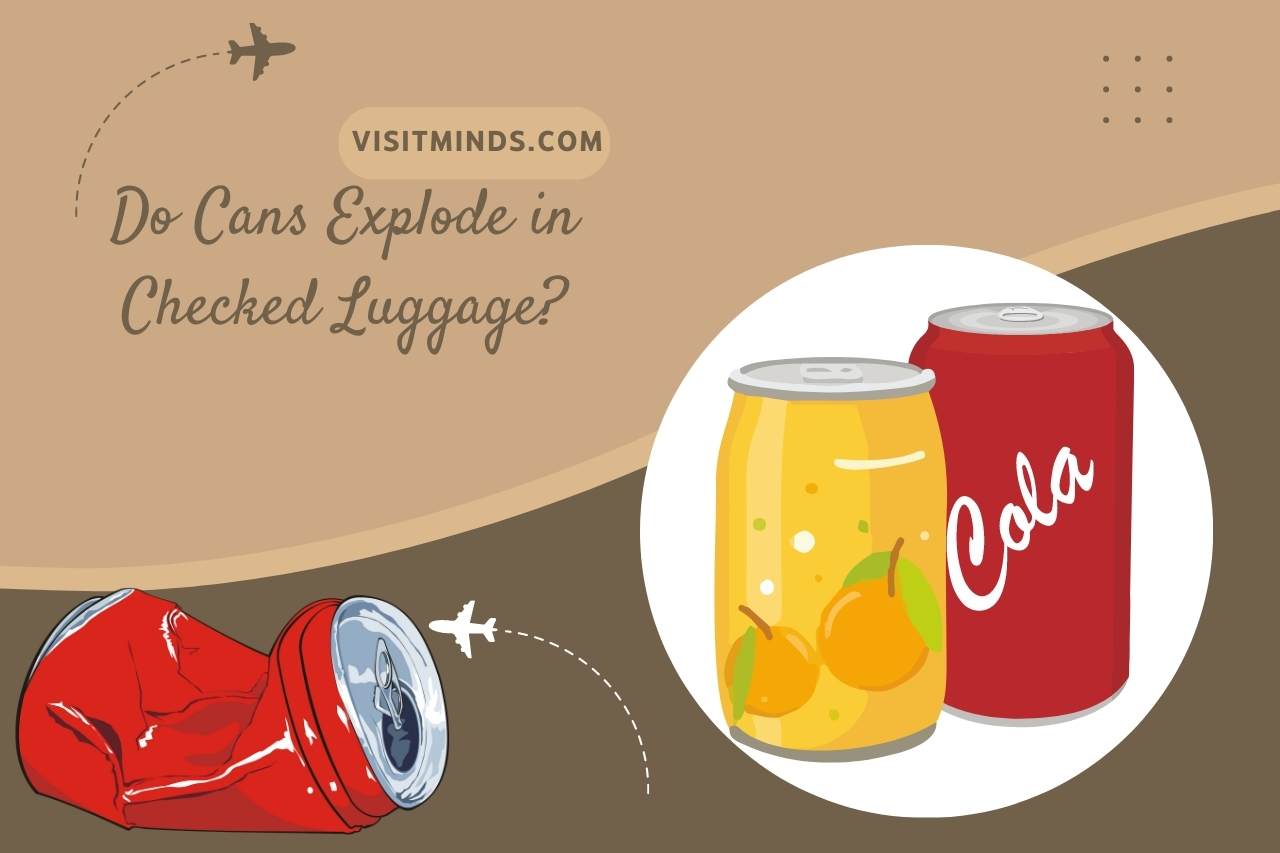Do Cans Explode in Checked Luggage? Safe Travel Tips!
It’s understandable to be concerned about the security of canned goods and whether they present any risks when flying. Can they explode in checked luggage? This thorough article will examine the elements that could lead to cans exploding in checked baggage. We’ll look at the science behind it and airline policies and give you helpful advice to ensure your trip is worry-free. We’re here to provide you with the knowledge you need to comprehend the safety issues of traveling with canned foods in your checked luggage, whether you’re a frequent traveler or planning your next vacation.
Can you Bring Canned Drinks on a Plane?
You are permitted by the Transportation Security Administration (TSA) to bring sealed, commercially produced beverage cans with you. These include alcoholic beverages, energy drinks, and juices in cans. It’s crucial to remember that each can’s liquid content needs to adhere to the airline’s carry-on fluid restrictions (often 3.4 ounces or 100 milliliters per container) and must be contained in a transparent, quart-sized plastic bag.
It would be best to take the quart-sized bag containing your canned drinks out of your carry-on bag and put it in a different bin for screening before passing through the security checkpoint. This makes it easier for TSA agents to visually verify the liquids and make sure they adhere to the rules.
Drinks in cans are typically permitted in checked baggage. It’s best to pack them safely to avoid harm from handling them. Consider using bubble wrap, clothing, or other padding materials to offer to pad and stop cans from being crushed or bursting.
Be careful while packing fizzy beverages because fluctuations in cabin pressure could lead to leaks or can bursts. It is advised to open the cans and let them depressurize before packaging them to reduce this risk. Packaging carbonated drinks in sealed, leak-proof plastic bags is also a good idea to prevent spills.
Researching the target country’s specific rules is crucial if you are traveling abroad. Import restrictions may apply to foods and drinks, particularly canned beverages, in several countries. To ensure compliance, study the destination’s agricultural and customs regulations carefully.
Do Airlines have Restrictions on Canned Goods?
- Soups and beverages in cans that contain liquids fall into the category of liquids or gels. They must abide by the airline’s rules regarding transporting liquids in carry-on luggage. 3.4 ounces (100 milliliters) or smaller containers that fit in a clear, quart-sized plastic bag are the general limits for liquids.
- You must take the quart-sized plastic bag containing the cans out of your carry-on bag and put it in a different bin for screening at the security checkpoint if you bring canned foods. TSA agents can more readily inspect the contents because of this.
- Certain canned products, mainly those regarded as hazardous or illegal commodities, are subject to certain limitations on several flights. Examples include things customs laws forbade, combustible substances, or canned goods containing alcohol.
- Speak with your airline to learn about restrictions on certain types of canned goods.
Do Cans Explode in Checked Luggage?
Checked baggage can often not explode, but there are a few things to consider that could raise the danger of leakage or damage.
- Like the passenger cabin, an aircraft’s cargo hold, where checked luggage is kept, is pressurized. This indicates that restricted luggage experiences very modest and controlled pressure changes. As a result, there is very little chance that a can may explode because of pressure changes alone.
- Checked baggage may still be vulnerable to rough handling and probable impacts during loading, unloading, and travel, even when the cargo hold is pressurized. Cans may be more susceptible to harm from moving objects or compression from heavy things if they are not adequately secured or protected. The cans may develop leaks or dents, but large-scale explosions are sporadic.
- Due to the carbonation release, carbonated beverages, especially those in cans, are more likely to leak or spray. Although it doesn’t happen often, changes in cabin pressure can cause carbonated cans to leak or burst. It’s best to open carbonated cans before packaging them to let any extra pressure escape to reduce this risk.
- It is advised to secure cans in checked luggage and cushion them with clothing or other soft objects to avoid movement and lower the chance of breakage. Adding bubble wrap or sealable plastic bags to cans protects against leaks.
What Types of Cans are Prone to Exploding in Checked Bags?
- Due to the pressure from carbonation, carbonated cans, such as those carrying soda, sparkling water, or energy drinks, have an increased chance of leaking or bursting. During the flight, changes in cabin pressure could create excess pressure inside the can, resulting in leaks or sprays. To let any extra pressure escape, it is best to open carbonated cans before packing them.
- Aerosol cans (for hairspray, deodorant, etc.), whipped cream canisters, and some automotive items are examples of cans or containers that are expressly made to be pressurized and may be more prone to leakage or rupture as a result of pressure changes. It’s crucial to verify with your airline or review their policies, as certain things may have particular rules or restrictions for air travel.
- Cans already dented, damaged, or have weak seals are more likely to leak or rupture while being transported by air. Before packing, check your cans for damage, and don’t use any that do.
- During air travel, cans containing dangerous or highly reactive substances, such as combustible materials or certain chemicals, may provide significant risks. Specific rules or limitations imposed by airlines or aviation authorities may apply to these substances.
How Should I Pack Cans to Prevent Explosions During Flights?
- Put the cans in a long-lasting, sturdy container like a plastic storage container or hard-sided luggage. Cans will be less likely to be crushed or punctured due to the additional layer of protection provided by this.
- To provide padding and avoid direct contact between the cans, wrap each one in bubble wrap or a layer of clothes. This will lessen the possibility of dents or other damage due to rubbing.
- To reduce the possibility of leaks, make sure that all cans are securely shut.
- Before packing, ensure the can lids are secure and in good condition.
- Keep the cans apart from sharp or pointed items in your luggage to prevent them from being punctured.
- Using partitions or placing them in a distinct space can help avoid interaction with potential dangers.
- Place the cans in the middle of your suitcase and surround them with soft materials like towels or shirts. This will add more padding and produce a buffer zone to take the brunt of any collisions.
- Do not overpack your suitcase to the point where the cans will be smashed or under undue pressure. To keep the cans’ structural integrity, leave ample room and avoid tight compression.
- You can use leak-proof containers made for transporting liquids or store individual cans in plastic bags that can be sealed if you are worried about leaks.
- This will add a layer of safety and aid in spill containment.
How Can I Minimize the Risk of Cans Exploding During Air Travel?
- When feasible, use non-carbonated beverages or canned foods. Carbonated drinks are more likely to build up pressure and leak or rupture while consumed in flight.
- Available carbonated beverages before packing if you bring them to let off any extra pressure. Pop the tab or open the can to accomplish this. Before resealing the can, give the beverage some time to depressurize.
- To prevent damage, pack the cans firmly and safely. Use a hard-sided suitcase or a plastic storage container to add further protection. Wrap each individual can in fabric or bubble wrap to protect them and reduce contact between cans.
- Surround the cans with soft things like shirts or towels to create a cushioning layer. This will lessen the possibility of cans being dented or punctured and assist in absorbing any impacts.
- Do not overpack or load your luggage, as this may put more strain on the cans and cause damage. Ensure there is enough room so the cans are not under too much pressure.
- In your luggage, keep the cans away from anything pointed or sharp. Ensure they are placed to reduce contact with potential dangers that could pierce the cans.
- Check the cans for any damage before packaging, such as dents or weakened seals. It is recommended to avoid packing a damaged can to lower the possibility of leaks or bursts.
What Happens If a Can Explode Inside Checked Luggage?
The can’s contents could spray out or spill due to the explosion, potentially harming other goods in your luggage. Stains, odors, and even complete damage to clothing, gadgets, and other items could result.
The explosion could ruin your luggage if it can contain food or liquid. It may take more time and effort to clean up the spilled contents and remove any scents or stains on your things.
Airport security or baggage handlers may need to check your bags in the event of an explosion to ensure there are no dangerous or prohibited items within.
Delays, further screening, or even the need for more research could follow from this. You can be qualified to submit a claim for compensation with the airline in particular circumstances if an explosion or can leak seriously damages the luggage or its contents.
Reimbursement is not always assured, and the procedure may differ based on the airline’s regulations and the specifics of the damage.
What Precautions Do Airlines Take to Prevent Can Explosions on Flights?
An aircraft’s cargo hold usually is pressurized and kept at a set temperature. This promotes the stability necessary to reduce the likelihood of explosions caused by sudden changes in temperature or pressure.
The loading and handling of checked baggage, including items like canned goods, is governed by airline policies. Luggage is customarily handled gently to avoid harsh impacts or excessive pressure that could harm or impair cans.
Airlines abide by stringent safety guidelines established by aviation regulators, including the Federal Aviation Administration (FAA) and the International Civil Aviation Organization (ICAO). Safely delivering hazardous goods, pressurized containers, and potentially volatile products are governed by these standards.
What Precautions should I Take Before Packing Cans in Checked Bags?
Review your airline’s policies and rules regarding packing liquids and canned products. Learn about any constraints, prerequisites, or limits that may apply.
This will assist you in packing according to their rules. Choose non-carbonated canned foods wherever you can to reduce the chance of pressure buildup throughout the flight. The carbonation inside the cans of carbonated drinks makes them more likely to spill or burst.
Check each can carefully for evidence of damage, such as dents, bulges, or compromised seals, before packaging. Cans already damaged should not be packed since they could leak or rupture more easily.
Watch this video,
Video Credits – Portable Professional
You May Also Like
- Traveling Light: A Visual Guide to 50 Pounds of Luggage
- Can You Pack Soda in Checked Luggage? – All You Need to Know
- Polypropylene or Polycarbonate – Making the Right Material Choice!
- Can I Use a Box for Checked Luggage? Unconventional Travel Tip!

Hi there, I’m Chathuranga, a travel enthusiast, web developer, and the chief editor of Visitminds.com. Traveling around the world, and experiencing different types of cultures, hotels, and destinations is my passion and I will put my best foot forward to share my knowledge on Visitminds.com via exciting blog posts to make you a pro traveler. Let’s do this!








